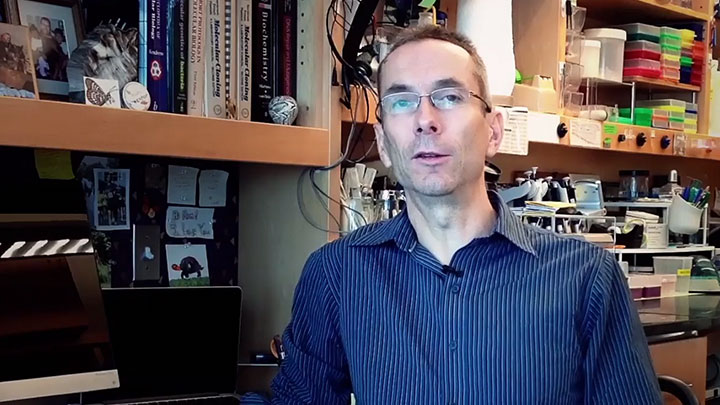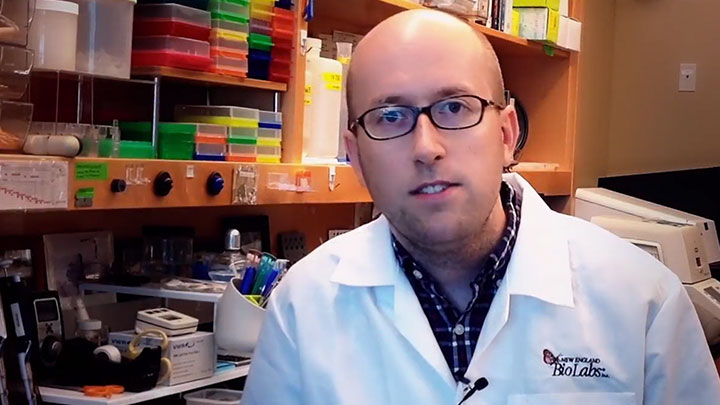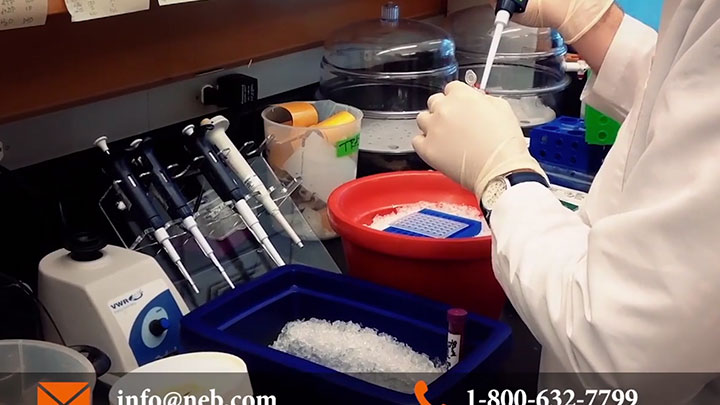NEB® TV Ep. 22 - Technical Support at NEB®

Script
NEB TV, what's trending in science.
Deana Martin:
Welcome to NEB TV. Today, I am joined by Inca Ghosh who is one of our scientists here at NEB. Hi, Inca.
Inca Ghosh:
Hi, Deana.
Deana Martin:
And we are talking about our Tech Support program.
In our Science in 60, Inca will give us an overview of NEB's Tech Support program. Then, we'll go behind the scenes and talk to some NEB scientists and get some more on their thoughts and perspectives about tech support. Lastly, we'll hear from Jeremy Foster who is a staff scientist here at NEB, and he'll tell us a story about a tech support call that he received that resulted in an interesting scientific collaboration.
Are you ready?
Inca Ghoush:
Yeah, let's go.
Deana Martin:
Let's get started.
Science in 60: Support from Bench Scientists
Inca Ghosuh
So most people don't realize that when they call NEB Technical Support, they actually are talking to a person who either developed the product, is an expert in its use, or actually produced the product.
At NEB, our scientists are happy to share their knowledge and experience about our products with other bench scientists around the world.
So when you call NEB Technical Support, rather than speaking to the technical support specialist who accesses information from the website, you actually can access the scientist who developed the product or uses the product and knows it inside out.
The idea of giving back is an essential component of the technical support philosophy here at New England Biolabs.
Customer Support with NEB Scientists
Yvette Luyten:
I think our technical support is unique, and what it means to me is that people who are using our products, people who are doing molecular biology have access to scientists who have worked with these products day in and day out. We use it in our research in the lab every day, and if we don't know the answer, we can get you the person that is the product manager or the one who actually developed the product to get the best answers to your questions that you need.
Chris Provost:
To me, NEB Technical Support means that we're just part of a greater scientific community and we're doing our part by helping researchers move their progress forward by answering any questions they may have about their research.
Paula Magnelli:
To me, it's the opportunity to have discussions with scientists from many places, from far away. And every time I'm on tech support, there's a chance that I will make one of those connections, I will have a new and fulfilling scientific discussion, scientist to scientist. And I feel like it's connecting. It's connecting with outside, and I think that that's great.
Cathy Rezac:
We're here for our customers. We're a resource and we're scientists like you, and we understand that it's frustrating when things don't work out. And we can help you get things working again as quickly as possible.
Ellen Guthrie:
I think my most memorable tech support moment was when somebody called me from NIST, which is one of the government support agencies. And they wanted to know how to remove glycans from an antibody. And she'd been struggling for a while, and I was able to suggest certain enzymes that would work for her. And from that, she got a huge publication and it was a good thing.
Yvette Luyten:
My most memorable moment was probably early on when I first started doing tech support. I had a graduate student who was just at the beginning and she was having a lot of problems just with general PCR and cloning. And I think we exchanged probably six to ten emails back and forth, back and forth trying to resolve the issues.
And when it finally started working, she was so excited. And we had communicated so much that she had shared all the data with me and was just so excited with her emails that it kind of felt like a victory for both of us.
Ashley Luck:
My most memorable tech support moments probably come from when I get calls involving products I've actually developed myself. So that's always nice that somebody's using a product that I helped put out there. And if they have questions about it, I'm usually one of the best people they can talk to. So I feel really confident answering those questions.
Nathan Tanner:
We use technical support to further our research by hearing from people who use our products. We think we launch the enzymes with applications in mind, but by directly engaging with people and doing new things or trying them in unexpected ways, we can develop better versions for the future or really come up with the tools that people want.
From Tech Support to Nature Paper
Jeremy Foster:
A customer called tech support, and their call got routed through to me because I had got some previous experience in this particular area. And the customer was looking for a way to digest DNA down to single nucleotides for mass spec analysis. So I was able to help them and point them towards a couple of publications and also recommended that they actually digested two nucleotides which allows for a much more sensitive and robust mass spec analysis.
And then I also advised them our recommendation for the cocktail of enzymes to do that job. They were quite happy with this recommendation and when they realized that we actually had previous experience in this area together with the necessary enzymology and the state-of-the-art mass spec instrumentation, they actually invited us to join them in a collaboration.
And this turned out to be very interesting and fruitful because our collaborator had actually engineered E. coli to be able to take up nucleotide triphosphates over unnatural bases, which E.coli could then incorporate into its DNA during replication within the cell. So our mass spec analysis actually provided definitive proof that the unnatural bases were incorporated into the DNA.
And this actually led to an interesting publication in the journal Nature, reporting the first semi-synthetic organism with an expanded genetic alphabet that went beyond the normal A, G, C, and T bases.
How to Contact Tech Support
Inca Ghosh:
There are three ways you can contact us at New England Biolabs Technical Support, by phone at 1-800-NEB-LABS, by sending an email to info@NEB.com, or you can use the Technical Support form on our website.
Deana Martin:
So Inca, thanks so much for joining me today.
Inca Ghosh:
Thank you, Deana. It was fun.
Deana Martin:
And thank you for watching. And as always, if you have any suggestions for future episodes, please let us know.
Related Videos
-

How Does the NEB® Technical Support Program Add Value for Customers? -

Is My Tech Support Question Too Basic? -

What is the NEB® Tech Support Philosophy?
